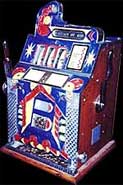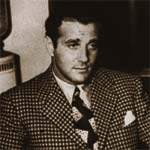History
 The
term "Slot Machine" originally applied to automatic vending
machines as well as gambling devices. In the 20th century, the term
became restricted to the latter. The first such gambling devices
in the United States were mere novelties that did not return coins
but presented gambling opportunities, such as two toy horses that
would race after a coin was inserted. Such devices set on a bar
in a saloon attracted wagering between patrons. The
term "Slot Machine" originally applied to automatic vending
machines as well as gambling devices. In the 20th century, the term
became restricted to the latter. The first such gambling devices
in the United States were mere novelties that did not return coins
but presented gambling opportunities, such as two toy horses that
would race after a coin was inserted. Such devices set on a bar
in a saloon attracted wagering between patrons.
Charles Fay built the first actual slot machines in 1887 in a shop in
San Francisco. He built nickel slot machines by hand and rented them to
the local gambling halls. His first machine was not cruder and bulkier
than modern slot machines, nor did its reels carry the fruit symbols commonly
used today. His original slot machine, called the Liberty Bell, was somewhat
smaller than modern machines, and operated in a similar way.
Fay's slot machines were a huge success, and he couldn't build them fast
enough in his small shop. Many larger gambling supply manufacturers tried
to buy the manufacturing and distribution rights, but Fay refused. However,
in 1907, Herbert Stephen Mills, a Chicago manufacturer of arcade-like machines,
began production of a machine very similar to Fay's Liberty Bell. The machine
Mills produced was called the Operator Bell. By 1910, slot machines were
much more common.
 Forces
of morality, and then of law, opposed the operation of slot machines.
Throughout the 1920s, slot machines were popular in many of the
United States, especially in resort areas, and they continued to
be popular into the Great Depression years of the '30s. In the late
40's, Bugsy Siegel added slot machines to his Flamingo Hilton hotel
in Las Vegas. Originally, the slot machines were used as a way to
entertain the wives and girlfriends of high rollers, but revenue
from the slot machines soon began supplanting that of the table
games. In the mid 1980's the popularity of slot machines and table
games were on par with each other, but by the 90's slot machines
had taken over and now account for over two-thirds of casino revenue
in the US. Forces
of morality, and then of law, opposed the operation of slot machines.
Throughout the 1920s, slot machines were popular in many of the
United States, especially in resort areas, and they continued to
be popular into the Great Depression years of the '30s. In the late
40's, Bugsy Siegel added slot machines to his Flamingo Hilton hotel
in Las Vegas. Originally, the slot machines were used as a way to
entertain the wives and girlfriends of high rollers, but revenue
from the slot machines soon began supplanting that of the table
games. In the mid 1980's the popularity of slot machines and table
games were on par with each other, but by the 90's slot machines
had taken over and now account for over two-thirds of casino revenue
in the US.
|

